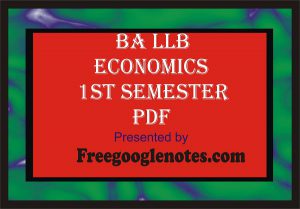Table of Contents
Ba LLB 1st semester economics notes pdf
Hello students,
here you will read Ba LLB 1st semester economics notes pdf (BA LLB)
Features of Socialism(ba LLB)
The main features of this system are as follows
(3) Definite Objectives. A socialist economy operates within definite socio-economic objectives. These objectives “may concern aggregate demand, full employment, the satisfaction of communal demand, allocation of factors of production, distribution of the national income, the amount of capital accumulation, economic development…and so forth.” for achieving the various objectives laid down in the plan, priorities and bold Largets are fixed covering all aspects of the economy.

(4) Freedom of consumption. Under socialism, consumer sovereignty implies that production in state-owned industries is generally governed by the preferences of consumers, and the available commodities are distributed to the consumers at fixed prices through state-run department stores. Consumers’ sovereignty under socialism is confined to the choice of socially useful commodities.
(5) Equality of Income Distribution. ln a socialist economy, there is great equality of income distribution as compared with a free market economy. The elimination of private ownership .in the means of production, private capital accumulation, and profit motive under socialism prevent the amassing of large wealth in the hands of a few rich persons. The unearned incomes in the form of rent, interest, and profit go to the state which utilizes them in providing free education, public health facilities, and social security to the masses.
(6) Planning and the Pricing Process. The pricing process under sOcialism does not operate freely but works under. the control and regulation of the central planning authority. There are administered prices that are fixed by the central planning authority. There are also market prices at which consumer goods are sold. There are also the accounting prices on the basis of which the managers decide about the production of consumer goods and investment goods, and also about the choice of production methods.
Merits of Socialism
(1) Greater Economic Efficiency. Economic efficiency under socialism is greater than under capitalism. The means of production are controlled and regulated by the central planning authority towards chosen ends. The central planning authority makes an exhaustive survey of resources and utilizes them in the most efficient manner. Increased productivity is secured by avoiding the wastes of competition and by undertaking an expensive coordinated manner.
( 2) Greater Welfare due to Less Inequality of Income. In a socialist economy, there is less inequality of income as compared with a capitalist economy because of the absence of private ownership of the means of production., private capital accumulation, and private profit. All citizens work for the welfare of the state and each is paid his remuneration according to his ability, education, and training. All rents, interests, and profits from various sources go to the state which spends them for public welfare in providing free. education, cheap and congenial housing, free public health amenities, and social security to the people.
(3) Absence of Monopolistic Practices. Another advantage of socialism is that it is free from monopolistic practices to be found in a capitalist society. Since under socialism all means of production are owned by. the state, both competition, and monopoly are eliminated. The exploitation by the monopolistic is absent. Instead of private monopoly, there is the state monopoly of the productive system but. this is operated for the welfare of the people, In the state-owned factories, socially useful commodities are produced which are of high quality and are also reasonably priced.
(4) Absence of Business Fluctuations. A socialist economy is free from business fluctuations. There is economic stability because the production and consumption of goods and services are regulated by the central planning authority in accordance with the objectives, targets, and priorities of the plan. Thus there is neither overproduction nor unemployment.


